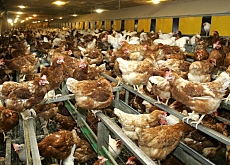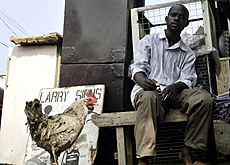Swiss poultry ordered back indoors

The Swiss cabinet has decided to reintroduce a ban on keeping poultry outdoors, following the discovery of the H5N1 virus in wild swans in neighbouring countries.
New cases of the deadly virus have been reported in Germany, Italy and Greece in recent days, while Austria and Slovenia have announced suspected cases.
Swiss poultry farmers will be subject to this second round of anti bird-flu measures from Monday.
The restrictions are not limited in time, the economics ministry said in a statement on Wednesday.
The cabinet’s decision came in response to a request from the Federal Veterinary Office.
The programme will include surveillance of migratory birds. The veterinary office plans to set up a permanent screening system.
Chicken, ducks, geese and other domestic fowl will have to be kept under a roof and fenced in to prevent contact with infected wild fowl.
“Bird flu is in the process of becoming a fixture in our region and Switzerland should be prepared to deal with this threat for years,” the statement said.
Swiss poultry farmers and producers have welcomed the new ban, saying it is important to reduce the risk of contamination. Poultry keepers added that they would have no problem adapting to the requirement.
Neighbours
The authorities in neighbouring Germany have ordered domestic fowl to be kept indoors from Friday, after the discovery of two cases of bird flu on the island of Rügen on the Baltic coast.
France and several other European countries introduced similar measures.
In Austria, where two cases of suspected bird flu were found on Tuesday, domestic fowl in designated high-risk areas along the country’s waterways have to be kept indoors.
Swiss poultry farmers were required to keep their birds inside from October 25 to December 15 last year, when migratory birds were crossing the country on their way south.
The authorities made it clear at the time that such restrictions could be reintroduced during the return flights of wild fowl from Africa to northern and eastern Europe.
From next month, wild fowl passing through Switzerland will once again be tested for bird flu. A surveillance programme last autumn found no evidence of the disease in some 800 birds.
Disastrous consequences
Any infection passed on to Switzerland’s 7.2 million domestic poultry population could have disastrous consequences not only for the poultry industry but also for society as a whole, experts warned.
The new European cases came just a few days after avian flu was detected in Africa for the first time.
Nigerian and international authorities announced last week that H5N1 had been detected on a poultry farm in northern Nigeria.
The west African state ordered the quarantine and culling of any fowl suspected of carrying the virus and has imposed restrictions on animal movements.
The deadly H5N1 virus, which originated in Asia, has so far killed more than 90 people, mostly in Asia, but also in Turkey and Iraq.
swissinfo with agencies
From October 25 to December 15 last year, the autumn migration period, Switzerland banned the keeping of domestic poultry outdoors.
Veterinary experts took samples from 800 migratory birds, but found no trace of bird flu.
Switzerland also banned imports of poultry products from affected countries and airport checks have been stepped up.
The anti-flu drug Tamiflu has been stockpiled to treat a quarter of the Swiss population.
The H5N1 strain has killed at least 90 people since early 2003, mainly in Asia.
Last year it reached Turkey, Romania and Croatia.
At the beginning of February it was reported in birds in Nigeria.
Five EU countries have announced cases this month: Italy, Greece, Bulgaria, Germany and Austria.

In compliance with the JTI standards
More: SWI swissinfo.ch certified by the Journalism Trust Initiative


You can find an overview of ongoing debates with our journalists here. Please join us!
If you want to start a conversation about a topic raised in this article or want to report factual errors, email us at english@swissinfo.ch.